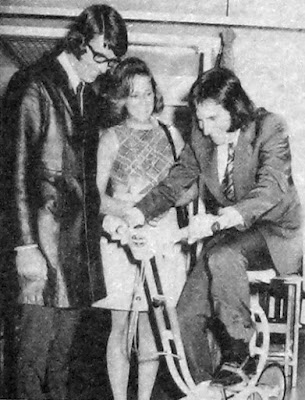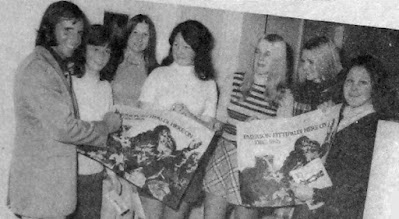 |
| Player's Horizon factory, August 2018 |
[An earlier version of this piece appeared online in 2018]
At the time of the official opening, over 1,100 people worked at Horizon, with a projection that over 2,000 would be employed there a year later.
The huge factory won awards for its architecture, with one set of award judges noting that it made a 'noble addition to the industrial area of Nottingham'. However, aesthetically speaking, it had as many enemies as friends, and the managing director of property agent Innes England once referred to it as 'probably the ugliest building in Nottingham'. For my part, I thought it was a hugely impressive and - certainly from the point of view of Nottingham's industrial and social history - important building.
Following the cessation of cigarette production at Horizon in 2016, hard-nosed commercial considerations won the day. The site was decommissioned in 2018, listed status proved elusive and demolition of the factory was complete by the end of 2019. Quite remarkable given that when, in 2012, the Nottingham Post produced a special edition of its Bygones publication to mark Horizon's 40th anniversary, it noted that it produced 'around 50 per cent of the UK market and 120 million cigarettes a day, generating billions in tax revenue for the Exchequer' (along with, presumably, a not-insubstantial contribution to the woes of the NHS).
 |
| Horizon during demolition, December 2018 (enhanced photograph) |
As of late 2023, the site is home to PowerPark - a speculative development of six warehouse units, all of which lie empty.
That's progress for you.
But let's rewind to happier times.
In the early 1970s, Player's, as part of the Imperial Tobacco Group, sponsored all manner of sporting and cultural events, but the real big-hitter was that epitome of glamour and excitement, Formula One.
Having originally become involved with motor racing in the late 1960s, Player's most successful promotional vehicles (excuse the pun) were the iconic John Player Special (or JPS)-liveried cars that plied their trade around the grand prix circuits of the world in the 1970s and 1980s in the hands of such renowned drivers as Emerson Fittipaldi, Mario Andretti, Nigel Mansell and Ayrton Senna.
When the Horizon factory opened, mutton-chopped Fittipaldi, from Brazil, having made his F1 debut in 1970, was the reigning world champion (the youngest to have achieved the distinction at that time), having beaten Jackie Stewart into second place over the course of 12 races between 23 January and 8 October 1972.
On 18 and 19 December 1972, Fittipaldi - presumably still basking in the glory of his championship victory whilst also having one eye on the upcoming 1973 season (due to start on 28 January) - paid a visit to Nottingham as a guest of Player's, accompanied on the first day by his wife, Maria Helena, and the Team Lotus F1 Competitions Manager, Peter Warr (later to become Lotus team manager following the death of Colin Chapman).
 |
| Peter Warr, Maria Helena Fittpaldi and Emerson Fittipaldi at the Player's medical department in Nottingham in December 1972 (source: Player's Post, 10 January 1973) |
 |
| 'Get your coats...' Emerson meets some Player's marketing girls (source: Player's Post, 10 January 1973) |
An itinerary was prepared, including tours of the Player's factories, and the Guardian Journal reported in an article in its 18 December edition that, 'A specially cleared running track round the [Horizon] factory will be laid out for the young Brazilian to show off to employees the car which helped to make him the youngest ever world champion.' The article went on to say that, '...it is hoped that 26-year-old Fittipaldi will top 100 m.p.h. for the benefit of the watching employees.'
In spite of foggy weather, the demonstration drive took place as planned. The in-house staff newspaper Player's Post reported afterwards that Fittipaldi thought he had reached 100 mph, and also noted that he had 'spun off for the first and only time in 1972.' Fittipaldi joked, 'I think we have the John Player Grand Prix here next year.' It must have been a thrilling sight for those lucky enough to have been in attendance. Assistant managing director Geoffrey Kent gained further bragging rights by having the Fittipaldis stay over at his house in Gonalston.
 |
| Emerson Fittipaldi about to set off on his Horizon demonstration drive (source: Guardian Journal, 19 December 1972) |
Fittipaldi's teammate for the following season was to be Swede Ronnie Peterson, who Fittipaldi thought would be 'very competitive'. These words were to prove prophetic, as Peterson finished the 1973 season only three points behind Fittipaldi, having won four grand prix to Fittipaldi's three. Both, though, were eclipsed by Jackie Stewart, who claimed the last of his three Formula One championship titles.
Fittipaldi won the Formula One world championship once more, with McLaren in 1974, before finally hanging up his F1 driving boots in 1980 to go racing in America. His marriage to Maria Helena ended in the early 1980s. Ronnie Peterson died following an accident at the 1978 Italian grand prix, while Peter Warr stayed with Lotus until 1989 and died in 2010.
It is said that, on quiet nights, on the site where Horizon once stood, the distant growl of a Ford Cosworth V8 F1 engine can sometimes be heard.
A place never forgets.
 |
| PowerPark, on the former site of Horizon, October 2023 |
No comments:
Post a Comment